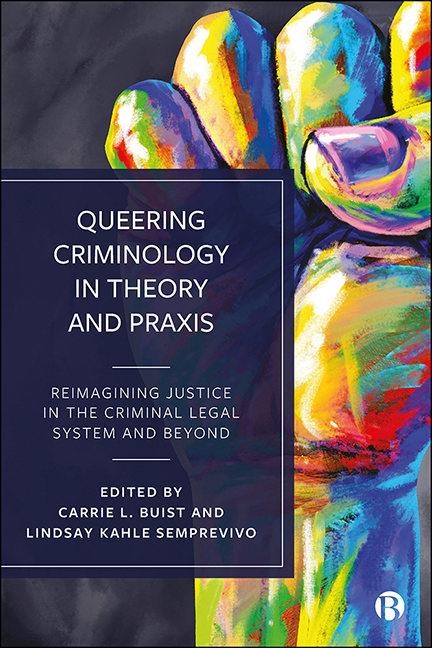 Queering Criminology in Theory and Praxis
Queering Criminology in Theory and Praxis Published online by Cambridge University Press: 15 September 2022
QAF
Women's prisons are epicenters of intersectionality. More than any other slice of society, these swelling institutions (Sawyer, 2018) contain multitudes of marginalized identities. Included is the trinity of ‘concentrated disadvantage’ (Richie, 2004) – race, gender, and class – but also people with disabilities, sex workers, immigrants, trans women and men, survivors punished. Every condemned combination and their literal mother is living there, one on top of another, ‘such a profound concentration of the most vicious forms of economic marginalization, institutionalized racism, and victimization that it can almost seem intentional or mundane’ (Richie, 2004, p. 438). Our invisibility, or rather the imagined soulless landscape in the back of every American psyche, lends credence to our dehumanity. We are called junkies, murderers, and violent offenders. ‘Labels on anyone can be notoriously misleading and unforgiving things’, said our friend Kelly Gissendaner (McBride, 2017, p. 32). In her wisdom and grace, she called us ‘real human beings in the real world’ (p. 31) –loving defiantly, as queer people once did, in closets.
In other words, women's prisons are queer as fuck.
As queer people have been throughout history, those of us imprisoned are forever and uniquely othered by the stigma of deviance. We are disenfranchised and discounted, an invisible substratum. In our pre-prison lives, some of us were criminalized by our queerness. As Stanley (2015) put it, ‘trans/gender-non-conforming and queer people, along with many others, are born into webs of surveillance … Inheriting a long history of being made suspect’ (p. 13). Heteronormativity is both policed and perpetuated when people are placed, quite literally, into one box or another. (People in men's prisons, for instance, face a different kind of brutally toxic environment to which we cannot speak. Ashley Diamond won the rights of trans people in Georgia prisons in 2015, only for them to be violated without oversight in the years since; Ashley Diamond v. Timothy Ward, et al., n.d.) Once inside, however, where we are desocialized, stripped of our street clothes and freeworld gender roles, there is ‘a natural evolution of gender fluidity’ (N. Herren, personal communication, November 17, 2020). Everyone is queered. Even those who work there escape the constant discerning gaze of gender assignment.
To save this book to your Kindle, first ensure no-reply@cambridge.org is added to your Approved Personal Document E-mail List under your Personal Document Settings on the Manage Your Content and Devices page of your Amazon account. Then enter the ‘name’ part of your Kindle email address below. Find out more about saving to your Kindle.
Note you can select to save to either the @free.kindle.com or @kindle.com variations. ‘@free.kindle.com’ emails are free but can only be saved to your device when it is connected to wi-fi. ‘@kindle.com’ emails can be delivered even when you are not connected to wi-fi, but note that service fees apply.
Find out more about the Kindle Personal Document Service.
To save content items to your account, please confirm that you agree to abide by our usage policies. If this is the first time you use this feature, you will be asked to authorise Cambridge Core to connect with your account. Find out more about saving content to Dropbox.
To save content items to your account, please confirm that you agree to abide by our usage policies. If this is the first time you use this feature, you will be asked to authorise Cambridge Core to connect with your account. Find out more about saving content to Google Drive.